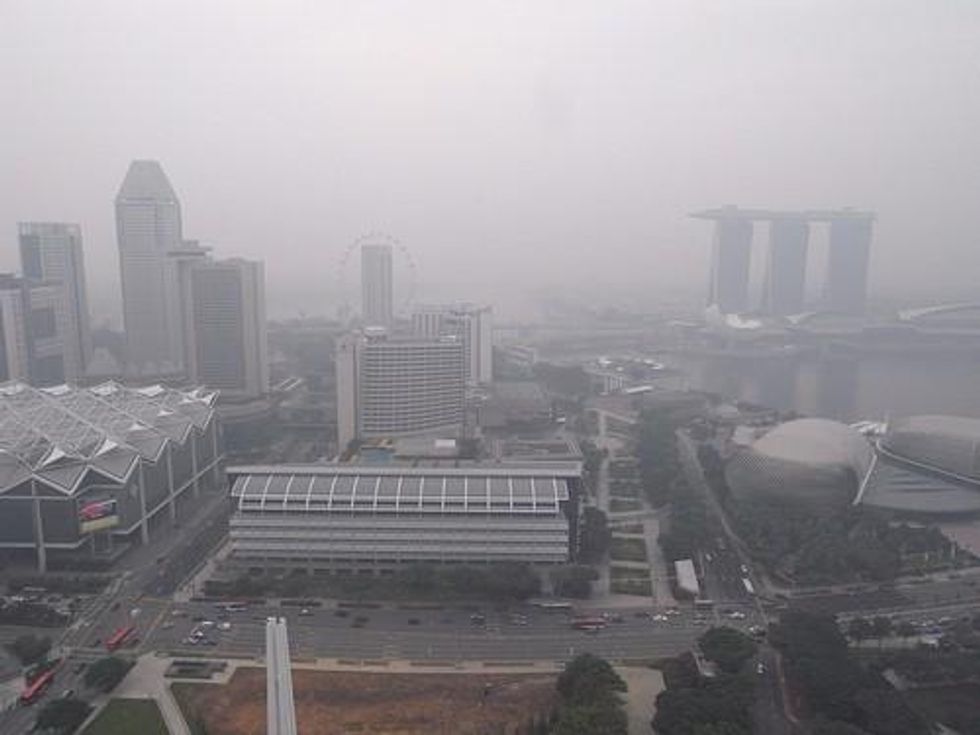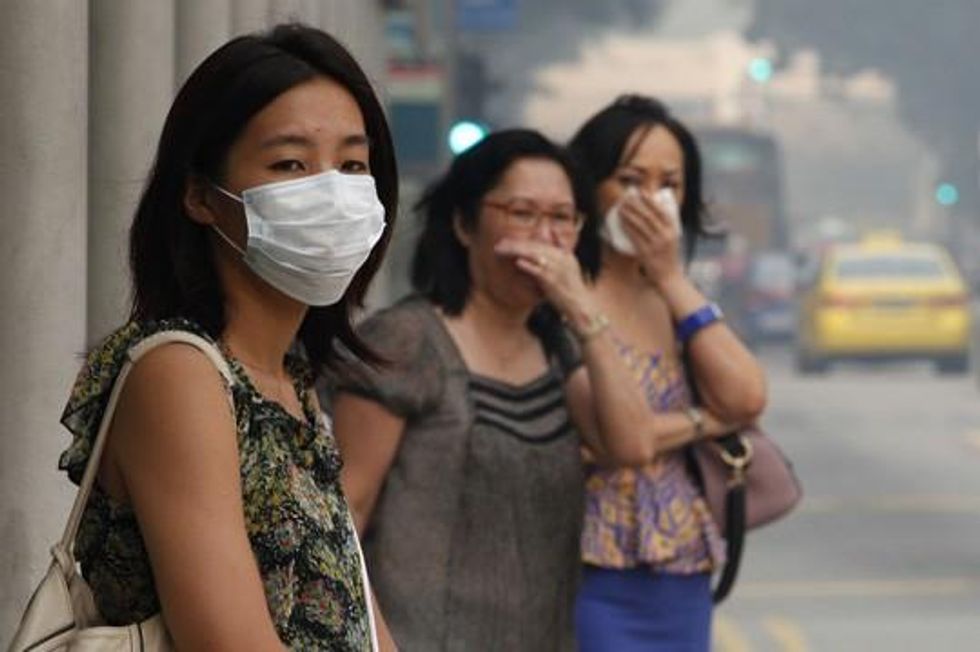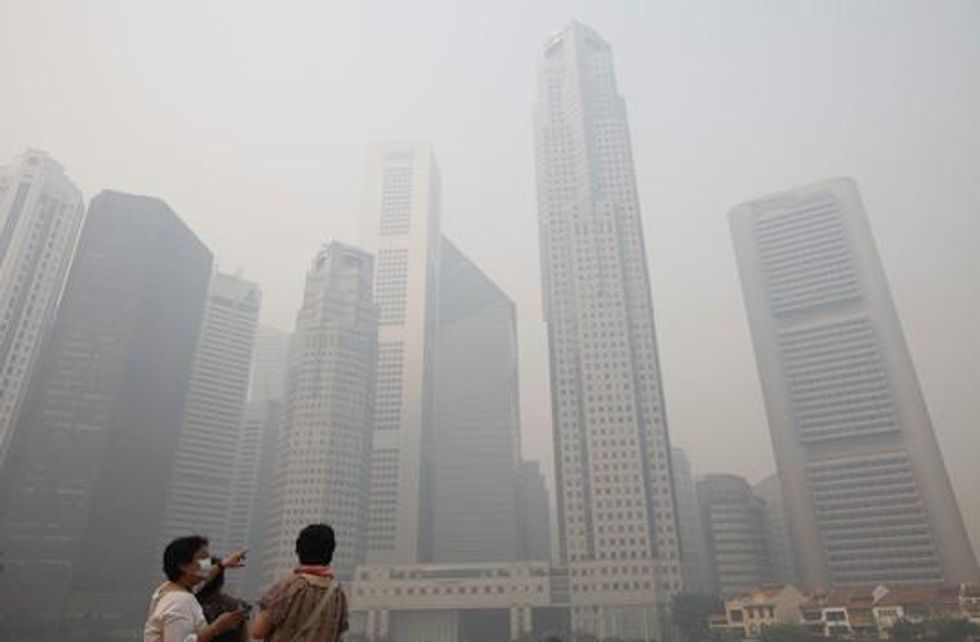Palm-Oil Giants Dodge Responsibility for Toxic Smog Covering Singapore
Record-breaking hazardous smog forces millions indoors

Meanwhile, the Singapore government points its fingers at nearby Indonesia as the palm-oil industry avoids fire.
The thick haze is filling the air with fumes so hazardous that officials have ordered the city-state's over five million residents to shutter up inside.
The heavy pollution obstructs passing light, and the BBC reports that stores are quickly running out of face masks as the crisis sets off panic.
No one knows when the record-breaking pollution will subside, but Singapore's Prime Minister Lee Hsien posited that the toxins could remain 'several weeks and quite possibly longer'.
Toxins in the atmosphere continue to climb to dangerous levels. Bloomberg News reports:
Singapore's Pollutant Standards Index jumped to a record 371 at 1 p.m., a level deemed hazardous, the National Environment Agency, or NEA, said on its website, and more recently was at 292. Malaysia said air pollution in Johor, which borders Singapore, reached hazardous levels of as high as 383.
The smog is not confined within Singapore's borders. Some areas of Malaysia also face smog hazards.
Greenpeace has blasted palm-oil companies, many of them Singapore-based, for their slash-and-burn method of clearing forests for plantations in the region.
The U.S.-based Cargill corporation numbers among the companies accused of slash-and-burn tactics.
Singapore government leaders are directing their anger at the nearby Indonesian island of Sumatra, claiming that the country holds responsibility for the fires that spurred the environmental disaster.
The Indonesian government is lashing back, insisting that Singapore must be accountable for its palm-oil companies that operate throughout the region.
Environmental activists insist the problem transcends national borders, and so must the solution. The AFP reports:
"Singapore is saying that Indonesia needs to enforce the law," Bustar Maitar, head of Indonesia Forest Campaign at campaign group Greenpeace International, told AFP.
"But in actual fact, some palm oil plantations in Indonesia are listed in Singapore and have headquarters in Singapore. A lot of Malaysian plantations are also based here in Indonesia," Maitar said.
"In my perspective, it is not only Indonesia. Singapore should also ask its companies who invest in Indonesia to not use fire, doing the same thing to enforce the law and increase environmental awareness."
Smog has been a point of contention between the two countries, as toxic haze has worsened over the past decade. Yet their trading relationship remains close, and the palm-oil industry has so far dodged accountability for slash-and-burn tactics.
The New York Times points out that this latest crisis adds to region-wide disaster as pollution soars across Asia:
The problems in Singapore and Malaysia come at a time of increasing concern about pollution across Asia, particularly in China, where pollution readings this year have been at least 30 percent higher than in previous years.


_____________________
An Urgent Message From Our Co-Founder
Dear Common Dreams reader, The U.S. is on a fast track to authoritarianism like nothing I've ever seen. Meanwhile, corporate news outlets are utterly capitulating to Trump, twisting their coverage to avoid drawing his ire while lining up to stuff cash in his pockets. That's why I believe that Common Dreams is doing the best and most consequential reporting that we've ever done. Our small but mighty team is a progressive reporting powerhouse, covering the news every day that the corporate media never will. Our mission has always been simple: To inform. To inspire. And to ignite change for the common good. Now here's the key piece that I want all our readers to understand: None of this would be possible without your financial support. That's not just some fundraising cliche. It's the absolute and literal truth. We don't accept corporate advertising and never will. We don't have a paywall because we don't think people should be blocked from critical news based on their ability to pay. Everything we do is funded by the donations of readers like you. Will you donate now to help power the nonprofit, independent reporting of Common Dreams? Thank you for being a vital member of our community. Together, we can keep independent journalism alive when it’s needed most. - Craig Brown, Co-founder |

Meanwhile, the Singapore government points its fingers at nearby Indonesia as the palm-oil industry avoids fire.
The thick haze is filling the air with fumes so hazardous that officials have ordered the city-state's over five million residents to shutter up inside.
The heavy pollution obstructs passing light, and the BBC reports that stores are quickly running out of face masks as the crisis sets off panic.
No one knows when the record-breaking pollution will subside, but Singapore's Prime Minister Lee Hsien posited that the toxins could remain 'several weeks and quite possibly longer'.
Toxins in the atmosphere continue to climb to dangerous levels. Bloomberg News reports:
Singapore's Pollutant Standards Index jumped to a record 371 at 1 p.m., a level deemed hazardous, the National Environment Agency, or NEA, said on its website, and more recently was at 292. Malaysia said air pollution in Johor, which borders Singapore, reached hazardous levels of as high as 383.
The smog is not confined within Singapore's borders. Some areas of Malaysia also face smog hazards.
Greenpeace has blasted palm-oil companies, many of them Singapore-based, for their slash-and-burn method of clearing forests for plantations in the region.
The U.S.-based Cargill corporation numbers among the companies accused of slash-and-burn tactics.
Singapore government leaders are directing their anger at the nearby Indonesian island of Sumatra, claiming that the country holds responsibility for the fires that spurred the environmental disaster.
The Indonesian government is lashing back, insisting that Singapore must be accountable for its palm-oil companies that operate throughout the region.
Environmental activists insist the problem transcends national borders, and so must the solution. The AFP reports:
"Singapore is saying that Indonesia needs to enforce the law," Bustar Maitar, head of Indonesia Forest Campaign at campaign group Greenpeace International, told AFP.
"But in actual fact, some palm oil plantations in Indonesia are listed in Singapore and have headquarters in Singapore. A lot of Malaysian plantations are also based here in Indonesia," Maitar said.
"In my perspective, it is not only Indonesia. Singapore should also ask its companies who invest in Indonesia to not use fire, doing the same thing to enforce the law and increase environmental awareness."
Smog has been a point of contention between the two countries, as toxic haze has worsened over the past decade. Yet their trading relationship remains close, and the palm-oil industry has so far dodged accountability for slash-and-burn tactics.
The New York Times points out that this latest crisis adds to region-wide disaster as pollution soars across Asia:
The problems in Singapore and Malaysia come at a time of increasing concern about pollution across Asia, particularly in China, where pollution readings this year have been at least 30 percent higher than in previous years.


_____________________

Meanwhile, the Singapore government points its fingers at nearby Indonesia as the palm-oil industry avoids fire.
The thick haze is filling the air with fumes so hazardous that officials have ordered the city-state's over five million residents to shutter up inside.
The heavy pollution obstructs passing light, and the BBC reports that stores are quickly running out of face masks as the crisis sets off panic.
No one knows when the record-breaking pollution will subside, but Singapore's Prime Minister Lee Hsien posited that the toxins could remain 'several weeks and quite possibly longer'.
Toxins in the atmosphere continue to climb to dangerous levels. Bloomberg News reports:
Singapore's Pollutant Standards Index jumped to a record 371 at 1 p.m., a level deemed hazardous, the National Environment Agency, or NEA, said on its website, and more recently was at 292. Malaysia said air pollution in Johor, which borders Singapore, reached hazardous levels of as high as 383.
The smog is not confined within Singapore's borders. Some areas of Malaysia also face smog hazards.
Greenpeace has blasted palm-oil companies, many of them Singapore-based, for their slash-and-burn method of clearing forests for plantations in the region.
The U.S.-based Cargill corporation numbers among the companies accused of slash-and-burn tactics.
Singapore government leaders are directing their anger at the nearby Indonesian island of Sumatra, claiming that the country holds responsibility for the fires that spurred the environmental disaster.
The Indonesian government is lashing back, insisting that Singapore must be accountable for its palm-oil companies that operate throughout the region.
Environmental activists insist the problem transcends national borders, and so must the solution. The AFP reports:
"Singapore is saying that Indonesia needs to enforce the law," Bustar Maitar, head of Indonesia Forest Campaign at campaign group Greenpeace International, told AFP.
"But in actual fact, some palm oil plantations in Indonesia are listed in Singapore and have headquarters in Singapore. A lot of Malaysian plantations are also based here in Indonesia," Maitar said.
"In my perspective, it is not only Indonesia. Singapore should also ask its companies who invest in Indonesia to not use fire, doing the same thing to enforce the law and increase environmental awareness."
Smog has been a point of contention between the two countries, as toxic haze has worsened over the past decade. Yet their trading relationship remains close, and the palm-oil industry has so far dodged accountability for slash-and-burn tactics.
The New York Times points out that this latest crisis adds to region-wide disaster as pollution soars across Asia:
The problems in Singapore and Malaysia come at a time of increasing concern about pollution across Asia, particularly in China, where pollution readings this year have been at least 30 percent higher than in previous years.


_____________________

